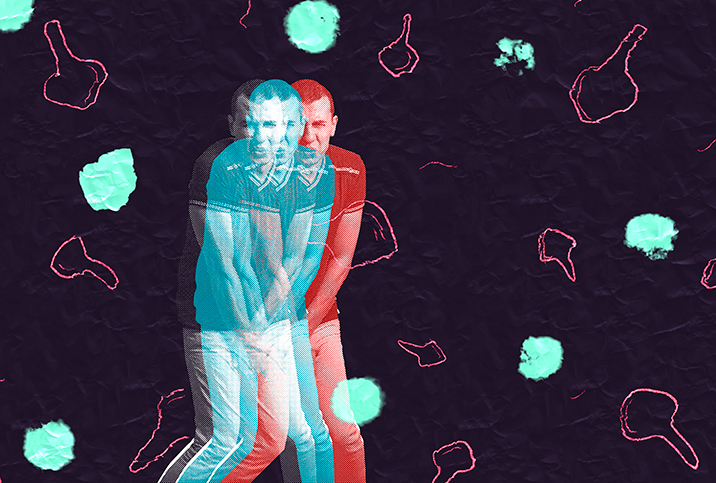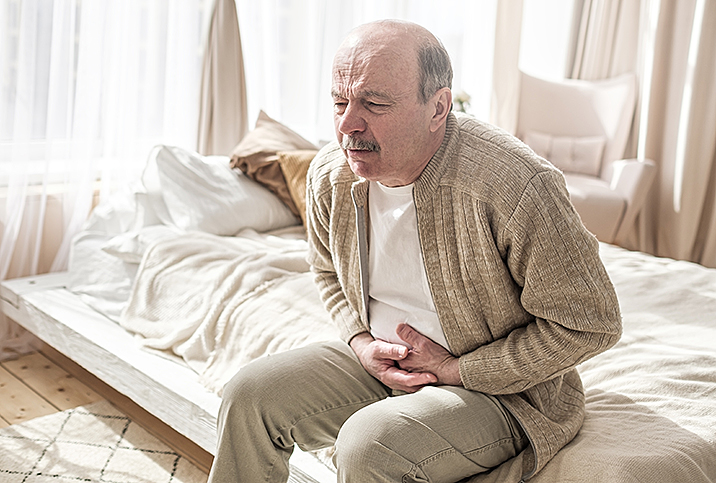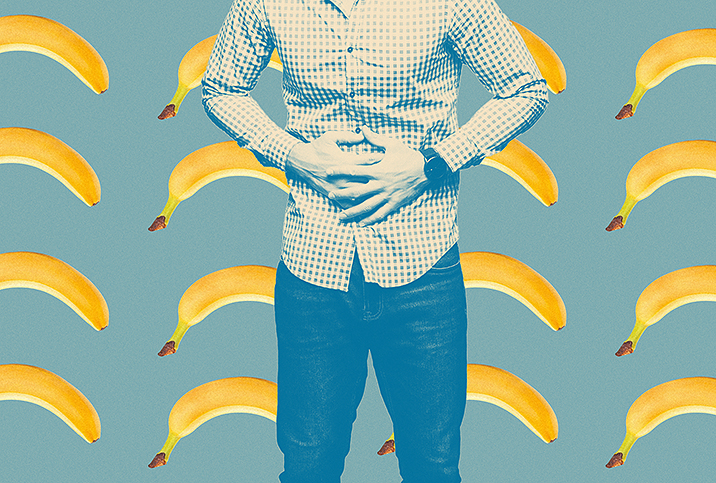How in the Heck Are Constipation and Testicle Pain Connected?

Key Points
- It may sound odd at first, but constipation and scrotal pain are related.
- Since your testicles are located in a very central region of the body, any pain caused by being backed up could radiate to your genitals.
- There are a number of reasons for testicular pain, some of which are serious, so it's important to see a healthcare provider to determine the cause.
Almost everyone gets backed up from time to time. That pain isn't limited to your abdomen. So what is the link between constipation and testicle pain?
Understanding chronic constipation
About 16 percent of American adults deal with chronic constipation, according to a 2010 study. And those digestive tract issues don't limit themselves to the digestive tract. They might actually be causing pain in your package.
"Constipation can absolutely cause testicular pain," said Patrick Nuzzo, D.N., a doctor of naprapathy (a system of treatment that involves the manipulation of connective tissue and adjoining structures) and the founder of the Southwest University of Naprapathic Medicine in Santa Fe, New Mexico. "The low back may also become affected."
Chronic constipation is diagnosed based on several factors. Generally, it means you poop fewer than three times per week and frequently need to strain to complete a bowel movement, according to Mayo Clinic.
Testicular abscess is often associated with skin changes—redness and drainage from the scrotum along with fevers and chills.
Other symptoms of chronic constipation include the following:
- Passing hard, dry stools
- Feeling like you are unable to empty your bowels completely
- Sensing a blockage when having a bowel movement
- Needing a manual maneuver during more than 25 percent of bowel movements
- Often requiring a laxative to have loose, soft stools
One common cause of chronic constipation is irritable bowel syndrome (IBS). IBS affects up to 21 percent of Americans and has no known cure.
It is also associated with chronic testicular pain, according to a 2023 research review.
Can constipation cause testicular pain?
Yes, bowel issues can lead to testicle pain; however, this is technically called scrotal content pain, since it's not actually the testicles that hurt.
Constipation-related scrotal pain can happen in a couple of ways.
Referred pain
Your scrotum sits at a very central location in the body. A vast network of nerves and blood vessels extends from the pelvis to other body parts.
"Nerve, lymph and blood supply travel through the body in neurovascular bundles (NVBs)," Nuzzo said.
The NVBs in your groin that are critical for erectile function contain nerves that can be traced back to your spine. Think of these nerves as a superhighway of sensation.
"Straining and having difficulty in having a bowel movement can lead to referred pain along the nerves that go to the testicles," said Vikas Desai, M.D., a urologist at Northwestern Medical Group in the Chicago area.
Referred pain indicates that irritated nerves in one region are sending the message. They are "referring" that pain to your scrotum. Straining during a bowel movement can put pressure on the nerves, Desai said.
If your large intestine is filling up and swelling with waste, this can cause the colon to press on the nerves of the abdominal region, causing you to feel pain anywhere from the scrotum to your lower back, Nuzzo said.
Inguinal hernia
Sometimes, constipation-related testicular pain is more of an indirect domino effect. That's the case with a hernia that puts pressure on your scrotum.
Here's how it happens.
Constipated people strain during bowel movements. Putting pressure and strain on your groin muscles daily can lead to an inguinal hernia, in which your abdominal tissue pushes through a weak spot in your muscles and into your groin.
Inguinal hernias sometimes extend into the scrotum. The result? Pain and swelling around your testicles.
How do you know if your constipation and testicle pain are connected? You don't. This isn't a situation for self-diagnosis.
Recommended:
- Can Constipation Cause Erectile Dysfunction?: The ties are somewhat indirect, but constipation could potentially cause ED.
- Can Too Much Protein Cause Constipation?: Consuming too much of this nutrient could affect your bowels and potentially much more.
- A New Vibrating Pill Treats Chronic Constipation: Vibrant is a drug-free, electronic device that helps with infrequent bowel movements.
What are other reasons for testicle pain?
Testicular or scrotal pain with chronic bloating or constipation may be a sign of IBS, but these symptoms could be traced to more serious health conditions.
See a doctor if your testicular pain lasts longer than a few days, and call your healthcare provider as soon as possible if a lump or swelling accompanies your pain, Nuzzo said.
Pay attention to whether your testicular pain improves after a bowel movement. If your pain persists after constipation is resolved, your doctor will consider other common causes of testicular pain, including the following:
- Hydroceles
- Spermatoceles
- Epididymal cysts
- Prostatitis
- Epididymitis
Testicular pain can also be caused by testicular torsion or a testicular abscess.
"Testicular abscess is…often associated with skin changes—redness and drainage from [the] scrotum along with fevers and chills," Desai said. "Testicular torsion [has] sudden onset pain."
Seek medical attention as soon as possible for both conditions. Torsion is a medical emergency that can cause the loss of a testicle in as few as six hours.
How do you get help for constipation-related scrotal pain?
Consult a healthcare professional anytime you experience new, persistent pain in your scrotum. Testicle pain can have many causes, some of them serious.
For testicular pain caused by chronic constipation, the underlying cause needs to be treated. Sometimes, this can be as easy as diet and lifestyle changes.
"Constipation can and should be relieved by making sure that you hydrate. Drinking six to eight glasses of water daily will help tremendously," Nuzzo said.
He suggests gently massaging your abdomen to help relieve symptoms. Abdominal massage can stimulate intestinal movement, relieve abdominal pain and increase the frequency of bowel movements in people with chronic constipation, according to a 2010 study.
Other common home treatments for constipation include eating more high-fiber foods, drinking coffee, exercising and squatting or using a footstool to raise your feet when sitting on the toilet.
Sometimes, constipation requires medical intervention. See a doctor if you're experiencing chronic constipation or a new bout of constipation that lasts longer than a week.
The bottom line
Constipation and the scrotal pain that can go with it aren't fun. Fortunately, there is treatment.
Although it might be embarrassing to discuss, it's important to see a doctor since this could be a sign of other, more severe conditions.


















